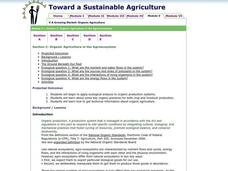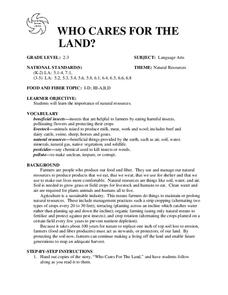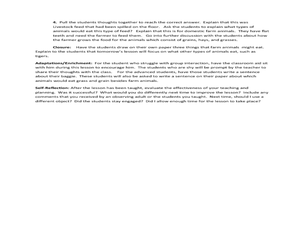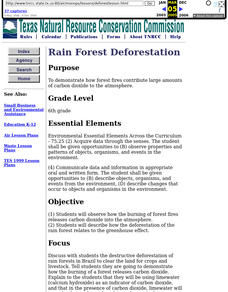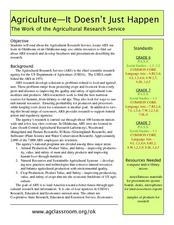Curated OER
Sustainable Livestock
Young scholars investigate healthy eating habits by researching livestock. In this food sustainability lesson, students research the negative impact factory farming has on our environment due to pollution. Young scholars define...
Curated OER
Toward a Sustainable Agriculture
Learners analyze organic production systems. In this organic agriculture lesson, students examine key organic practices for both crop and livestock. This lesson includes 5 different activities, 4 critical thinking questions and...
Curated OER
WHO CARES FOR THE LAND?
Learners explore the importance of natural resources. They are given copies of the story, "Who Cares For The Land," and students follow
along as the teacher reads it. Learners identify the key points in the story. (Soil, water and air...
Curated OER
What's in it and Who Eats it?
First graders explore farming by illustrating images. In this livestock lesson, 1st graders discuss what types of plants are used to feed livestock animals and how pets and humans eat the livestock animals. Students draw images of what...
US Department of Agriculture
Agriculture Counts
Agricultural survey and the documentation of livestock or goods was the basis for the first written language. Youngsters discuss sorting and counting, and how these skills have been used for thousands of years. They accent their class...
Curated OER
Arthur Young and the President
Students work with NASS data by converting it into prose. In this historical agriculture information lesson, students read about how George Washington communicated information about crop yields, livestock, and land values. They apply the...
Curated OER
What's It All About?- Kansas Prairies
Students examine the interdependence of animal life and the environment. In this Kansas prairies lesson, students read background information on prairies and complete a worksheet to identify the main idea.
Curated OER
What's Your Brand?
Students explore the history of branding livestock and discover it began as early as 2000 BC. They discuss reasons for branding and then design their own brand from pipe cleaners. Students dip their brand into paint and print it on...
Curated OER
Dear George Using Census Data
Sixth graders discuss differences in the way in which information was disseminated in George Washington's time and how it is acquired in contemporary times. They examine Census of Agriculture data and a modern day version of a letter...
Curated OER
Rain Forest Deforestation
Sixth graders explore the destructive deforestation of rain forests in Brazil to clear the land for crops and livestock. Students demonstrate how the burning of a forest releases carbon dioxide by performing an experiment.
Curated OER
Meet the Tiger
Here is an excellent lesson tigers that has a research component. Integrated into the lesson is the premise that God created animals and the human responsibility to care for them. At learning centers students visit various Websites and...
Curated OER
Agriculture: It Doesn't Just Happen
After reading an informational text on the Agricultural Research Service, learners research the role of the ARS in Oklahoma. Using reputable online sources, they label a map of the state with relevant areas. Researchers focus on one of...
Global Oneness Project
The Value of Ancient Traditions
Imagine having to give up cell phones, computers, and TV? What would be lost? What gained? An examination of the Drokpa, a nomadic people who live in the grasslands of Tibet, provides class members an opportunity to consider how access...
Curated OER
Reading Comprehension 4
Ever needed a reason to stop eating meat? Read this interesting (and slightly disgusting) passage with your class to assess reading comprehension.
Curated OER
Agriculture Shapes Kentucky History
Students explore the lives of early American Indians and settlers in Kentucky. They describe the agricultural practices of Indians native to Kentucky and develop a supply list for a group of settlers coming to the state to establish...
Curated OER
Is It Ethical to Eat Meat?
Have your class join a blog about whether or not eating meat is good for you. They'll read several passages regarding meat processing and consumption, then they post what they think. There are six critical-thinking prompts to help them...
McGraw Hill
Determine the Meaning of Words and Phrases
Work on using context clues in your social studies class. Pupils read a brief selection about the terrain in Senegal and define each of the underlined words in the space provided. They also list the context clues that helped them...
Curated OER
The Bean Book
A well-designed book on beans teaches kids about the anatomy of a bean. They cut out parts of a bean and paste them together. There are a lot of good descriptions of the parts of beans, such as the embryo, stored food, and the seed coat....
Curated OER
"Cereal" Comic Strip
Learners discuss how wheat is important to our everyday lives, from food to insulation, focusing on how wheat grains are processed into food items. Students then create a comic strip of the steps of processing grain to demonstrate...
Curated OER
Foods
Students identify what types of items are grown on a farm. They discuss how those items are processed and turned into food they everyday. They are to write a paragraph using transition words.
Curated OER
Wild Dog Debate
Students participate in a mock conference addressing the possible extinction of African wild dogs. In this wild dogs lesson plan, students state their arguments and ask questions about the issues they have researched.
Curated OER
Step by Step
Young scholars explore agriculture by creating a food production diagram. In this farming lesson, students read assigned text about the entities that assist in food production companies such as farmers, truckers and supermarkets. Young...
Curated OER
Ag Pays
Second graders understand that may jobs relate to agriculture. In this agriculture lesson, 2nd graders role play several agricultural jobs and the goods associated with them. Students may contact a community member with that job.
Curated OER
Next Year's Seeds
Reading, a math game, and a simulation activity provide the engagement on a lesson about seeds and crops. Learners in grades two through four read an informational passage about crops, seeds, and farming. They highlight important...
Other popular searches
- Livestock Industry
- Livestock Horses
- Livestock Feed
- Alternative Livestock
- Livestock Nutrition
- Livestock Evaluation
- Dairy Livestock
- Livestock Judging
- Livestock Auction
- Livestock Feed Ratio
- Alternative Livestock Farming
- Domestication of Livestock

